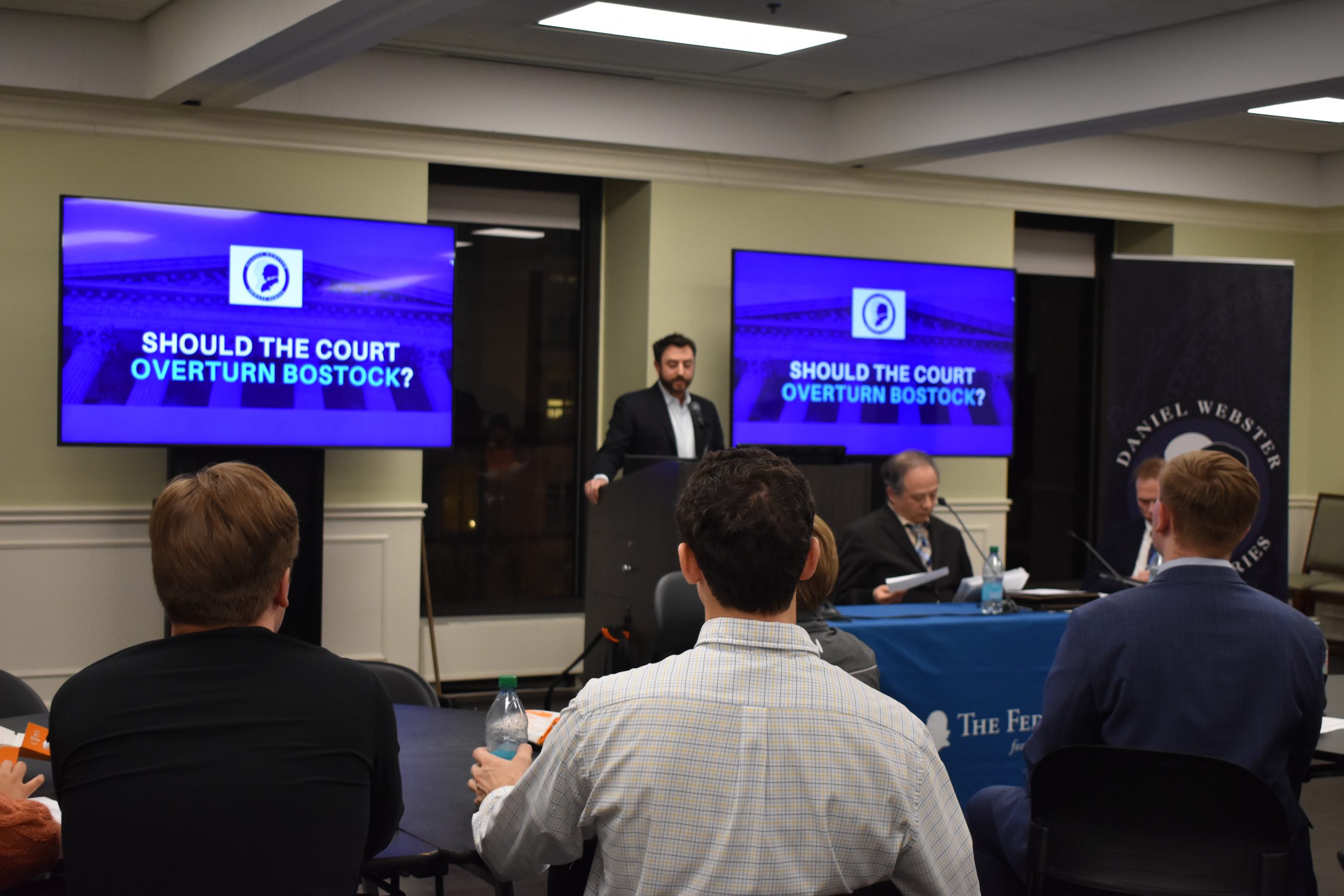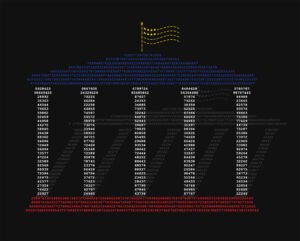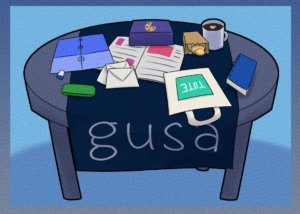On Jan. 27, Outlaw, an LGBTQ+ affinity group at the Georgetown University Law Center, posted a petition denouncing an event hosted by the Federalist Society. Outlaw later protested the event—a debate on whether the landmark Supreme Court case Bostock v. Clayton County should be overturned—with their own counter event on the same day, Jan. 29.
Bostock v. Clayton County is the 2020 Supreme Court case that enshrined protection against workplace discrimination for LGBTQ+ employees. The case concerns Clayton County’s decision to terminate Gerald Bostock in 2013 because of his identity as a gay man; the court ultimately sided with Bostock.
The Federalist Society is a conservative and libertarian legal society with chapters at law schools across the country. Their Jan. 29 debate was entitled, “Should the Court Overturn Bostock?” Simultaneously, Outlaw hosted a discussion titled, “Beyond Bostock: Personal & Professional Perspectives on LGBTQ+ Anti-Discrimination Laws.”
Outlaw’s petition asserted that the Federalist Society’s event implied that Bostock should be overturned, “inviting harm to a marginalized community on our campus.”
“Free speech is an important right that should be protected. However, hosting an on-campus debate on the merits of this well-settled case may signal to others, on this campus and throughout the broader community, that denying legal protections to LGBTQ+ individuals is legally and socially permissible,” Outlaw’s petition stated.
Outlaw and the Georgetown Law Federalist Society declined the Voice’s requests for comment on this piece.
“The Federalist Society is founded on the principles that the state exists to preserve freedom, that the separation of governmental powers is central to our Constitution, and that it is emphatically the province and duty of the judiciary to say what the law is, not what it should be,” a handout given out at the debate stated.
The event was part of the ongoing Daniel Webster Debate Series and was moderated by Judge Corey Maze (LAW ’03) of the U.S. District Court for the Northern District of Alabama. Josh Hammer argued in favor of overturning Bostock. Hammer works as senior counsel with the Article III Project, an organization that advocates for conservative judicial nominees. Civil rights attorney Jon Greenbaum, a former adjunct professor at Georgetown Law, argued against.
Both the debate and Outlaw’s counter event were held simultaneously at 6:00 p.m. in the Law Center. As students walked down the hallway to enter the Federalist Society event, members of Outlaw handed out printed copies of their petition, asking attendees to sign it electronically.
Central to the Bostock ruling is the question of whether Title VII of the Civil Rights Act of 1964, which protects against discrimination due to sex, applies to sexual orientation. Justice Neil Gorsuch wrote the majority opinion of the case, while Justices Samuel Alito and Brett Kavanaugh both wrote dissenting opinions.
During the Federalist Society debate, Hammer argued that the Bostock ruling was not in line with Congress’ original intention in writing Title VII.
“It’s just completely implausible. Completely implausible that this is what Congress meant back in 1964. Which again, just reiterates something I said earlier, what with a time period where the notion of so-called ‘gender identity’ was literally not a thing,” Hammer said.
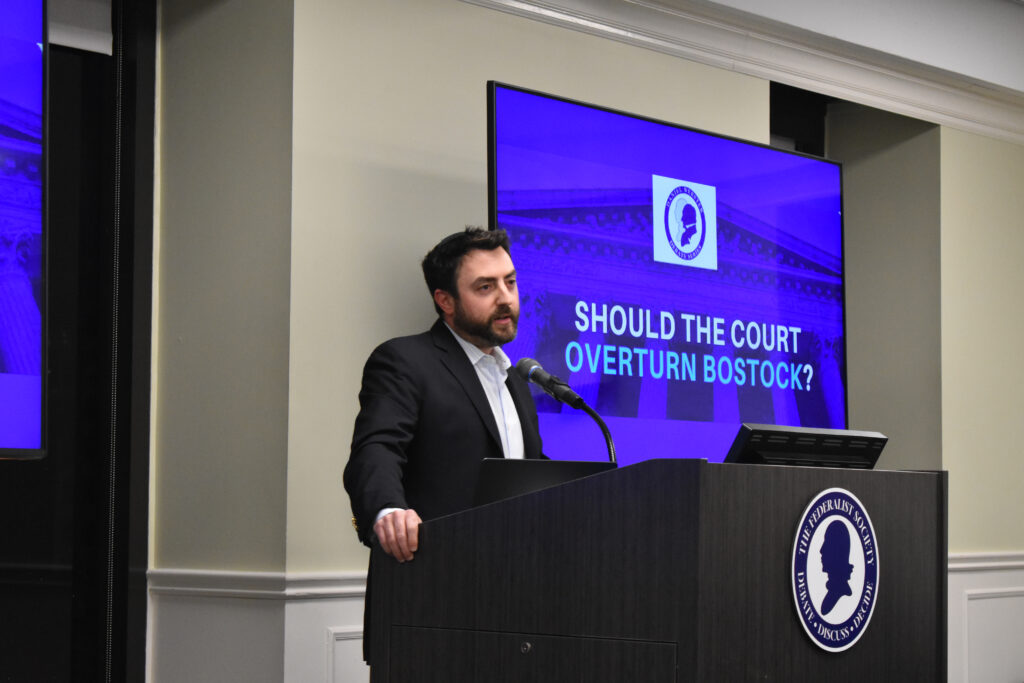
Photo by Izzy Wagener Josh Hammer, senior counsel with the Article III Project, delivers his opening statement.Photo by Izzy Wagener
Greenbaum argued that while the primary goal of the Civil Rights Act of 1964 was to eliminate Jim Crow laws in the South, it’s dangerous to try to determine the original intention behind a statute.
“I think the interpretation of the words should be consistent with what their current meaning is,” Greenbaum said.
About 30 people were in attendance at the debate. It was also live-streamed on Youtube.
“I thought it was cool because it kind of raised awareness for the case, and I thought they aired both sides well,” Andrew Jakab (LAW ‘27), an attendee, said of the event.
At the same time, Outlaw hosted a separate discussion on the second floor of the building. About 50 people attended in person. The event was also live-streamed on Zoom.
Outlaw’s counter event featured Georgetown Law Professors Kevin Tobia and Naomi Mezey. The event explored the merit behind Gorsuch and Alito’s opinions and the future of discrimination law.
Tobia outlined a hypothetical to explain Gorsuch’s argument.
“I go to work and I bring my husband to the work party and when the employer fires me because they don’t like gays, Gorsuch’s argument is, ‘If my sex had been different and I came to work with my husband, that employer wouldn’t fire me,’” Tobia said.
According to Tobia, Alito would point to the original intent of the legislators behind Title VII. Tobia agreed that Congress was likely not considering discrimination based on sexual orientation when the legislation was written in 1964, but didn’t believe that should be a key point in the case.
“It’s almost a nonsensical question to sort of ask about this in 1964,” Tobia said.
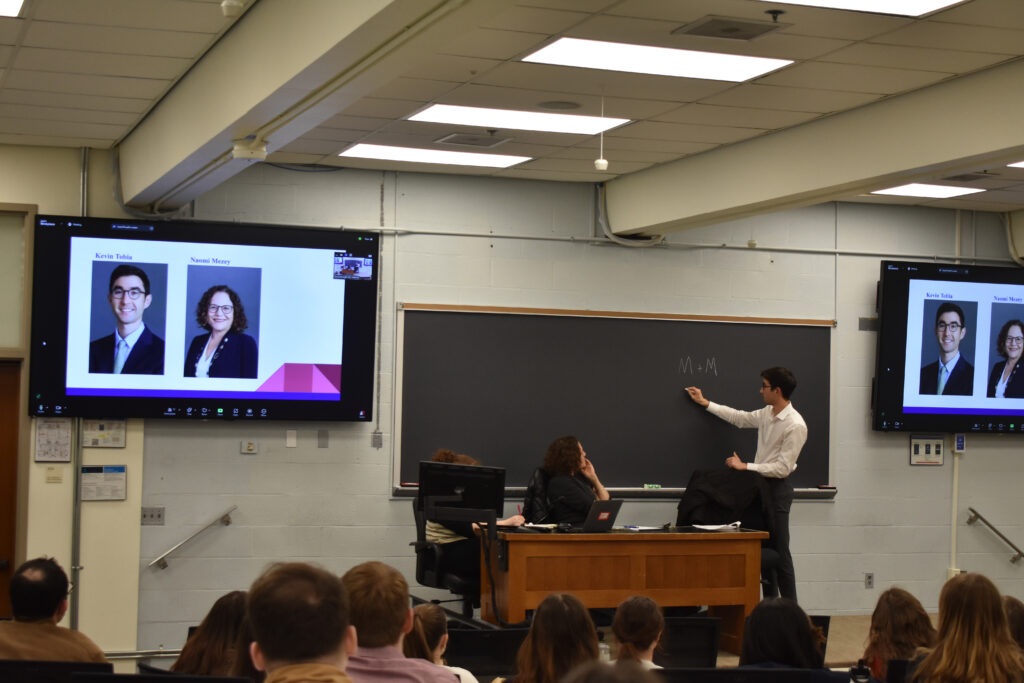
Photo by Izzy Wagener Georgetown Law Professor Kevin Tobia writes on the chalkboard to demonstrate the opposing arguments of Bostock v. Clayton County.Photo by Izzy Wagener
Tobia and Mezey both stated that they thought it was unlikely Bostock would be overturned. Tobia also emphasized the importance of legal challenges to government policies in the wake of President Trump’s recent executive orders. Many of these orders, including one that directs agencies not to abide by the Bostock ruling, will impact the LGBTQ+ community.
“Right now, lawyering work is really, really critical. Even though these executive orders of the past week are horrific, the response is not just acquiescence, right? The response is contesting every single one. Because they’re all highly contestable,” Tobia said.
Grace Riordan (LAW ‘27), who attended the Outlaw event, heard about the Federalist Society debate from Outlaw. She had studied Bostock in class.
Riordan told the Voice about the textualist nature of Gorsuch’s opinion and the fact that some see textualism as a more conservative approach. Textualism is a constitutional theory that prioritizes the plain meaning of the words in a law over considering Congress’ original intent or the statute’s legislative history.
“I’m pretty fascinated by the Bostock decision because it’s, like they were saying, a textualist approach that ends up giving a very liberal and just and equitable decision.” Riordan said. “Referring back to that case is really interesting and I think illuminates a lot of the tools that we have going forward—that textualism is not a conservative tool only.”
Riordan said that staying involved in work like Outlaw’s helps her remain hopeful.
“Although it seems bleak, I definitely really resonate with what Mezey and Tobia said about, you know, this is arguably the most important time to be involved in this kind of work and community-building. So that’s what I like to focus on,” Riordan said. “It’s also a coping mechanism.”


